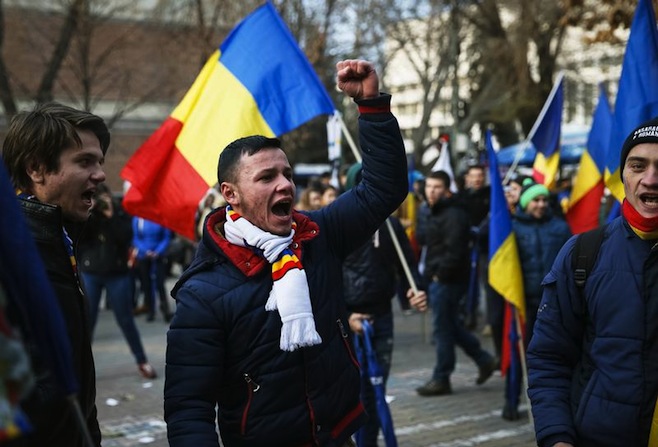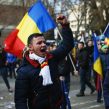
Moldovan Anti-Government Protests Unify Pro-Western, Pro-Russia Groups Across Ethnic Lines (Part Two)
Publication: Eurasia Daily Monitor Volume: 13 Issue: 20
By:

*To read Part One, please click here.
Drawing together citizens of various ethnicities, divergent political affiliations, and fluid views on Moldova’s ultimate orientation (see Part One, EDM, January 28), recent massive social protests in Chisinau could mark the birth of a Moldovan civic identity, one that would bridge those entrenched divisions. Interpreting the current social protests in this hopeful vein are the pro-Western, right-of-center, tone-setting representatives of Moldova’s civil society. A Moldovan civic patriotism, were it to develop out of this social movement, could provide the now-missing basis for Moldovan statehood, and a political consensus for transformative European reforms.
Taking the movement to that follow-up stage, however, will require cooperation among the existing political parties of the opposition: parliamentary and extra-parliamentary, pro-Western and pro-Russia. Their common goal at the present stage is to pressure the newly-installed, unelected government, into accepting pre-term parliamentary elections, as well as presidential elections by popular vote (Infotag, Jamuary 18, 24, 29).
These objectives imply turning back the regime change that Moldova’s financial-political hegemon, Vladimir Plahotniuc, has almost completed in recent weeks. Because it came about in slow motion until the recent climactic phase, it was not immediately fully clear that this is not merely a change of government, but an outright regime change. The protesters in the streets have sensed this all along, and the political parties now coalescing in the opposition seek to reverse that regime change through elections.
Three political organizations have joined forces to spearhead this movement. These are: the Platform for Dignity and Truth, a Romanian-speaking, pro-Western, right-of-center civic group and nascent political party; the Socialist Party (main parliamentary opposition) and Our Party (largest extra-parliamentary party), both of them leftist, pro-Russia, and with mixed (“Moldovan”-speaking and “Russian-speaking”) voter bases.
The Platform’s leading figures range in terms of political origins and generations from veterans of the 1989–1991 Popular Front (no longer Romanian-irredentists) to young bloggers and students. It has found an impetuous leader in Andrei Nastase, and it brings prominent representatives of civil society to speak at the Platform’s rallies. The Socialist Party under Igor Dodon had a straightforward message until recently: suspending the European Union–Moldova Association Agreement and joining the Russia-led Customs Union (neither of which would be feasible in practice) and Moldovanism against Romanianism (an issue of diminishing relevance by now). Renato Usatii’s Our Party is a typical “project party,” Russia-oriented but otherwise difficult to decipher. It was almost certainly a Russian project at its inception in 2014; it served as one of Plahotniuc’s tools to destroy Vlad Filat and his Liberal-Democrat Party in 2015 (mission almost accomplished); and recently it turned against Plahotniuc, recasting Our Party as populist, rather than pro-Russia.
The Platform initiated the protest actions last year. The Socialists and Our Party followed suit with their own protests, their tactics mirroring the Platform’s since September 2015. The three organizations have been attacking the same targets: high-level corruption, the “oligarchy” and its “usurpation of power,” vested interests that “captured” the state’s institutions. Yet, with all their convergent appeals and slogans, the two protest streams were starkly different in their origins, and did not hasten to combine their forces.
It was not until the fourth week in January that the unthinkable happened: These three parties staged mass rallies together, and their leaders and activists shared the platforms at mass events. They are emphasizing the common tactical goals while temporarily effacing their basic differences (Unimedia, Jurnal.md, IPN, January 20–28).
Parallel but separate protests, led by the romanophone pro-Europe right and the russophone red left, respectively, had been ongoing until January 20. That evening, the pro-Plahotniuc parliamentary majority approved the new government of Pavel Filip in semi-secrecy, short-circuiting the constitutional and legal procedures. The government then took the oath of office also in semi-secrecy. The ruling Democratic Party’s leaders resorted to such maneuvers for fear of public protests, but unwittingly provoked an even angrier backlash. Protesters forced their way into the Parliament’s building and fought with the police, until the leaders of the three protest movements arrived at the scene to restrain their supporters.
It was at that moment that Nastase, Dodon and Usatii decided to join forces into a common movement. Their decision basically ratified the action of their respective supporters, who had already joined forces spontaneously that evening, without instructions and perhaps unexpectedly even to themselves. Nastase’s, Dodon’s and Usatii’s joint appearance at the rally on January 21 was a stunning moment, unthinkable until then. From that day onward, the three organizations shared speakers’ platforms while their followers mingled in the streets and squares. On each day they marched 10 to 15 kilometers through Chisinau, massing outside government buildings to present their demands—e.g. for de-politicization of judicial and law enforcement institutions, air time on public television, and the holding of parliamentary and presidential elections as the central objective.
By common decision, pro-EU and pro-Russia messages are ruled out as potentially divisive. No party flags and no symbols of either the EU or Russia are seen at these events; only Moldovan flags are being displayed.
This new constellation is tactical by its nature. If snap elections are called, which the whole opposition demands, those two parties of the pro-Russia Left are likely to win. They are distant frontrunners in the public opinion polls at present; but this could be a temporary situation, following the discreditation of most “pro-Europe” politicians and pending the development of an alternative force. If elections are held, their timing will be key to the outcome. The emergent pro-Western parties of the center-right need some months to organize.




